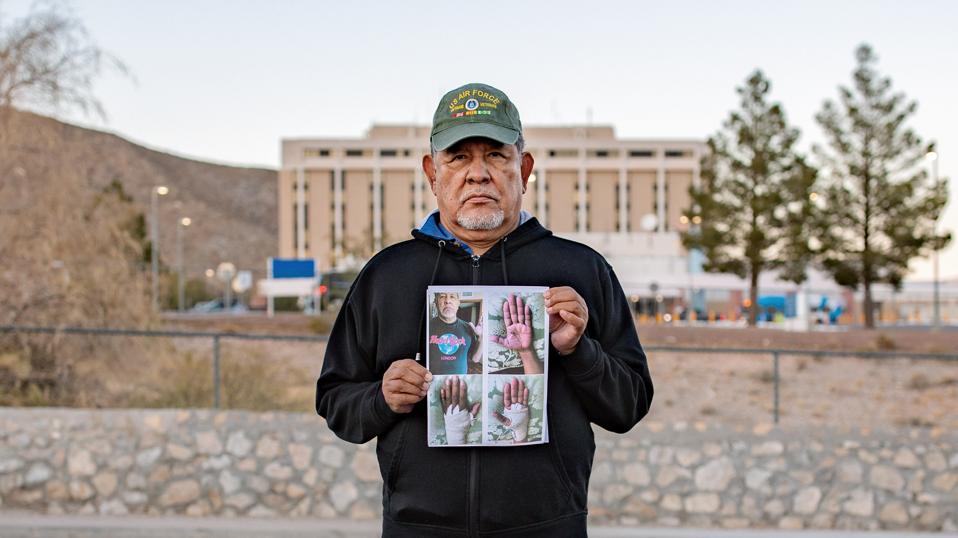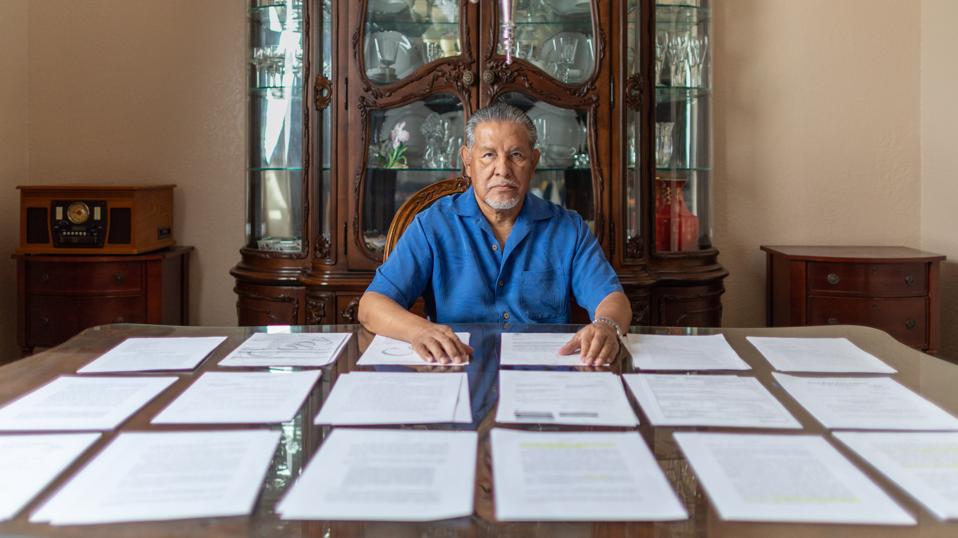- Like
- SHARE
- Digg
- Del
- Tumblr
- VKontakte
- Flattr
- Buffer
- Love This
- Save
- Odnoklassniki
- Meneame
- Blogger
- Amazon
- Yahoo Mail
- Gmail
- AOL
- Newsvine
- HackerNews
- Evernote
- MySpace
- Mail.ru
- Viadeo
- Line
- Comments
- Yummly
- SMS
- Viber
- Telegram
- JOIN
- Skype
- Facebook Messenger
- Kakao
- LiveJournal
- Yammer
- Edgar
- Fintel
- Mix
- Instapaper
- Copy Link
Shortly after he graduated from high school in El Paso, José Oliva served in Vietnam, spending the war’s deadliest year in charge of 12 men, all of whom survived. When he came home, Oliva spent decades working in law enforcement. But Oliva suffered his most dangerous engagement after he retired, when he was brutally choked and beaten by police while trying to see the dentist.
In February 2016, Oliva went to his VA hospital in El Paso for a routine dental appointment. Oliva waited in line at a security checkpoint, placing all his belongings (including his ID) in a plastic bin. One of the officers manning the metal detector, Mario Navar, twice demanded Oliva to show his identification. Both times Oliva tried to explain that his ID was in the bin.
Agitated, Nivar forced Oliva into a chokehold. Another officer, Hector Barahona, grabbed Oliva’s arm so violently, it “made a loud popping sound.” After subduing the 70-year-old veteran, Nivar and Barahona handcuffed Oliva and charged him with “disorderly conduct.” Though that charge was ultimately dropped, the assault inflicted lasting damage, forcing Oliva to undergo two surgeries for his shoulder and treatment for PTSD.
“I feared for my life,” Oliva said. “I survived the bloodiest year in Vietnam, and here I was fearing for my life as these officers beat and choked me in a VA hospital in my own hometown. It was three against one, and they had guns. I knew better than to resist.”

José Oliva stands in front of the Veteran Affairs hospital in El Paso, Texas where he was brutally … [+] beaten in an unprovoked assault by law enforcement there. He has now filed a cert petition with the Supreme Court.
Institute for justice
Further rubbing salt into his wounds, when Oliva tried to sue the officers for violating his civil rights, the Fifth Circuit U.S. Court of Appeals used an obscure legal loophole to toss his lawsuit. Undeterred, Oliva has joined forces with the Institute for Justice and filed a cert petition on Friday urging the U.S. Supreme Court to hear his case. Failing to overturn the Fifth Circuit’s decision would leave “an enormous constitutional vacuum” that allows “thousands of federal police in Texas, Mississippi, and Louisiana to disregard the Fourth Amendment.”
“By withholding constitutional remedies from veterans at VA facilities as a means to push back against these abuses,” the petition noted, “the Fifth Circuit has decimated the Fourth Amendment rights of American veterans—the very people who fought to preserve those rights for us all.”
Federal law (specifically, Section 1983) expressly allows individuals to sue state and local officers for damages who violated their constitutional rights. But there’s a major loophole. This federal civil rights law doesn’t cover federal agents accused of violating civil rights.
Nearly 50 year ago, the Supreme Court began to close this loophole for certain violations. In 1971, the Supreme Court held that Webster Bivens, who had his home searched without a warrant, before being manacled and strip searched, could sue the federal narcotics agents responsible for infringing on his Fourth Amendment rights.
By crafting this “cause of action,” Bivens v. Six Unknown Named Agents of Federal Bureau of Narcotics opened up a new pathway to hold federal employees accountable, particularly for individuals with no other legal remedy available. Or as Justice John Marshall Harlan wrote in his concurrence, “For people in Bivens’ shoes, it is damages or nothing.”
After Bivens, the High Court extended its ruling to cover claims involving sex discrimination under the Fifth Amendment, and for failing to provide adequate medical care to prisoners under the Eighth Amendment. However, in the decades since, the Supreme Court has taken a sharp turn and now views expanding Bivens to a “new context” to be a “disfavored judicial activity.”

A native of El Paso, Texas, José Oliva fought with distinction in Vietnam and served nearly three … [+] decades in law enforcement, but was savagely beaten by officers at a VA hospital.
institute for justice
Curtailing Bivens has also created yet another opportunity for federal employees to evade accountability, a fact Oliva experienced firsthand. At first, Oliva found success in the courtroom. A district judge held that Bivens applied to his case and that the officers were not entitled to qualified immunity. But on appeal, the Fifth Circuit sided with the officers, thwarting Oliva’s ability to even try and hold them accountable.
According to Judge Andrew Oldham, Oliva’s case “differs from Bivens in several meaningful ways.” It took place “in a government hospital, not a private home,” involved a different federal agency, and the conduct was much more egregious in Oliva’s case than in Bivens, since “the narcotics officers did not place Webster Bivens in a chokehold.”
But the Fifth Circuit narrowed Bivens to an utterly absurd degree, breaking with seven other federal appellate courts. Moreover, as recently as 2017, the Supreme Court held that even if extending Bivens should be “disfavored,” that does not “cast doubt on the continued force, or even the necessity, of Bivens in the search-and-seizure context in which it arose.”
In its cert petition, the Institute for Justice noted that the Supreme Court “has never limited search-and-seizure Bivens claims to narcotics investigations, private homes, or situations in which an individual is handcuffed in front of family members” but “generally permitted claims against federal police who violate the Fourth Amendment during ‘standard law enforcement operations.’” Yet under the Fifth Circuit’s decision, “unless an individual finds himself handcuffed in his apartment in front of his family by narcotics officers, he has no constitutional remedy in Texas, Louisiana, or Mississippi,” IJ’s cert petition asserted.
In addition to the Supreme Court taking action, Congress could easily close this loophole. Last summer, Reps. Jamie Raskin and Hank Johnson introduced legislation that would codify Bivens. In a refreshing contrast to gargantuan bills running thousands of pages long, their bill would have added only five words to Section 1983. But this small lexical tweak would have dramatically bolstered accountability. With criminal-justice reform a top priority for the 117th Congress, such legislation must also protect José Oliva and other victims of rogue federal agents.
“If the Fourth Amendment doesn’t protect a 70-year-old veteran beaten by federal police inside a veterans’ hospital for no reason, it doesn’t protect anyone,” noted Institute for Justice Attorney Patrick Jaicomo.


